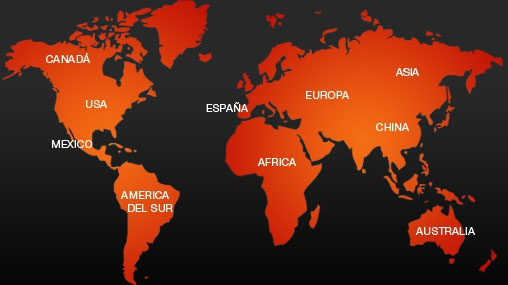- Inicio Acerca de RM Minerales
- Galería de fotos Blog RM Contacto
- Microscopia e instrumentos Pedidos Aviso legal
Copyright 2010-2025
www.rosellminerals.com



Ejemplar con un agregado de asbecasita, con facetas cristalinas. Color amarillento. Se dispone sobre una matriz con cristales hexagonales de clinocloro. Una especie difícil de encontrar. Este ejemplar procede de la localidad tipo.
En este ejemplar podemos ver brillantes agregados de cristales marrones y transparentes de römerita, un sulfato de hierro muy raro. Se acompañan de coquimbita, con un intenso color violeta bajo luz fluorescente o tipo LED. Ambos se acompañan de metavoltina/copiapita amarillos, junto con algo de halotriquita fibrosa. Bajo la lupa podemos navegar en un mundo de cristales brillantes, con especies como la krausita (de color amarillento a gris transparente). Dejamos este placer de identificación al coleccionista. En cuanto a su estabilidad ambiental: esta muestra se ha almacenado durante más de ocho años sin alteraciones notables.
Este es un espécimen de azufre excepcional, tanto para esta lacalidad rusa como por la perfección de los cristales. En una cavidadde la matriz se disponen diversos cristales muy definidos y biterminados de azufre, mostrando claramente las facetas de bipirámides de diferentes órdenes. Con brillo, entre translúcidos a transparentes. Con otro grupo de cristales, uno de ellos predominante, en la parte lateral. En una matriuz con cristales escalenoédricos de calcita. Ejemplares de esta mina y con esta calidad son más que difíciles de ver. Un ejemplar procedente de la colección Astor (Barcelona). Puede encontrar más información de esta localidad en geo.web.ru.
Espécimen muy rico formado por numerosos agregados de cristales aciculares blancos (transparentes) de picrofarmacolita, acompañados de eritrita rosada rica en Mg (hörnesita), junto con farmacolita y sainfeldita. En matriz. Estos ejemplares fueron extraídos de la mina Bou Azer en febrero de 2018. Son muy estéticos bajo aumento, con buen tamaño para colección.


Los cristales de yeso de Piła son extremadamente raros de ver hoy día. En este ejemplar antiguo tenemos dos cristales maclados con apilamientos muy característicos del yacimiento polaco. Transparentes, brillantes y definidos. Presentan alguna pequeña mella debido a lo blando de la especie, sin afectar a la belleza e interés de la pieza. Con etiqueta manuscrita.
En este ejmplar podemos observar estéticos y brillantes agregados de cristales lanceolados de hidromagnesita, foliáceos, formando rosetas, de intenso color blanco, aunque son incoloros. Todos ellos se disponen sobre una matriz de roca. Una pieza catalana de las que hoy día cuesta encontrar, con especies poco habituales y con calidad. Recogida por Joan Astor en marzo de 1976.
Grupo divergente de cristales biterminados de amatista de esta famosa localidad de Guerrero. Un combinado estético de cristales de amatista de color zonado, más intenso en el núcleo, translúcidos a transparentes. Pequeñas mellas en las puntas, solo visibles bajo lupa. Casi imposibles de conseguir hoy día. De la colección Trigo (Mataró).
Ejemplar formado por una costra de smithsonita violeta, botrioidal, de rosa a lila, con brillo satinado y translúcida. Una muestra en miniatura de los antiguos ejemplares de la localidad clásica de Choix. Con etiqueta de la colección Trigo (Mataró) donde indica Durango y smithsonita cobaltífera. Pero la localidad es Choix.
Cristal de cuarzo hialino, de buen tamaño, que nos muestra un "fantasma" interior que sigue la geometría del principal. Con tono verdoso, probablemente debido a un miembro del grupo de la mica, fuchsita. Estos ejemplares son raros de ver hoy en día.
Ejemplar de muy buen tamaño formado por numerosos cristales lanceolados de barita, con muy buena definición de caras y aristas. Entre transparentes a translúcidos y con un color amarillento con zonación. Se disponen en una matriz con cristales de calcita y fluorita de tonos melados. La fluorita es activa bajo la luz UV-OL. Una pieza excepcional para esta mina asturiana.
Ejemplar de muy buen tamaño (15.5 cm) de vanadinita, formado por numerosos agregados de cristales, en ambas caras de la pieza, y dispuestos sobre una sólida matriz. Buen brillo, con cierta transparencia. Para vitrina.
Grupo de cristales de cuarzo, bitermninados, en crecimiento paralelo, con prismas desarrollados y facetas terminales definidas, translúcidos. Estos ejemplares fueron recogidos en esta cantera coruñesa que explota el cuarzo, una de las principales minas del mundo por la calidad y la cantidad de sus reservas. la mina fue descubierta en 1968 por tres gallegos que le dieron su nombre (de sus apellidos SEñarís, RAma y BALboa) a la concesión y que la encontaron mientras exploraban esos montes de la zona del Pico Sacro en busca de seixo (gal. roca blanca y muy dura) de buena calidad.
Grupo de cristales de cuarzo, bitermninados, en crecimiento paralelo, con prismas desarrollados y facetas terminales definidas, translúcidos. Estos ejemplares fueron recogidos en esta cantera coruñesa que explota el cuarzo, una de las principales minas del mundo por la calidad y la cantidad de sus reservas. la mina fue descubierta en 1968 por tres gallegos que le dieron su nombre (de sus apellidos SEñarís, RAma y BALboa) a la concesión y que la encontaron mientras exploraban esos montes de la zona del Pico Sacro en busca de seixo (gal. roca blanca y muy dura) de buena calidad.
Agregados de brillantes cristales de barita, transparentes y de un tono ligeramente amarillo. Se acompaña de pequeños cristales de esfalerita, complejos, y de galena. Procede de las Mines d'Osor, actualmente cerradas y de las cuales es imposible obtener estos ejemplares. La mina cerró en 1979 y llegó a tener once plantas con un pozo de 290 metros de profundidad. Aún se pueden ver las ruinas de las antiguas instalaciones y el pozo de donde se extraía y trataba esfalerita, galena y fluorita.
Grupo de cristales de ferberita de muy buen tamaño, brillo excepcional y de caras y aristas definidas. De esta clásica mina portuguesa. Procede de la colección Arguijo.
La scholzita es un raro fosfato de calcio y zinc, con localidad tipo en Alemania, aunque los ejemplares más ricos y estéticos se han encontrado en esta mina australiana. El ejemplar nos muestra, por ambos lados, numerosos agregados de cristales prismáticos, casi aciculares, transparentes y brillantes. Se acompaña de agregados globulares de calcofanita (analizados por SEM-EDS).
La scholzita es un raro fosfato de calcio y zinc, con localidad tipo en Alemania, aunque los ejemplares más ricos y estéticos se han encontrado en esta mina australiana. El ejemplar nos muestra, por ambos lados, numerosos agregados de cristales prismáticos, casi aciculares, transparentes y brillantes. Se acompaña de agregados globulares de calcofanita (analizados por SEM-EDS).
Ejemplar formado por agregados de cristales radiales de aragonito, con bandeados muy estéticos de color azul. Este ejemplar antiguo (años 80) viene etiquetado como procedente de Peñamellera, en Asturies. Otros ejemplares como este y de la misma época venían con esta localidad asturiana. Una curiosidad de la colección Joan Astor (Barcelona). Viene en su caja original y etiquetada.
Grupo de cristales de analcima, muy facetados y entre translúcidos a transparentes. Se disponen sobre una matriz parcialmente recubierta de pequeños cristales prismáticos de prehnita. De una cantera actualmente restaurada.
Los ejemplares de vivianita de Camerún son un clásico de la mineralogía mundial. Esta cuenca lacustre, pantanosa, contiene arcillas en cuyo seno se encontraron agregados de cristales de vivianita que tenían más de 2 metros de diámetro, con cristales individuales de hasta 1,35 metros. Este ejemplar tiene más de 40 años y sigue estable, con reflejos verdosos. Hoy día cuesta encontrarlos. Procede de la colección Joan Astor (Barcelona), con etiqueta manuscrita.
Ejemplar de estibiconita reemplazando totalmente de un cristal de estibnita, muy elongado, con terminaciones múltiples, parcialmente recubiertas de cristales escalenoédricos de calcita con crecimientos escalonados. Un clásico de la mineralogía mexicana. Procede de la colección Joan Astor (Barcelona) con etiqueta manuscrita y mecanografiada.
Los ejemplares de pirita de la isla de Elba són un clásico italiano. Pero ejemplares de pirita, con cristales facetados, definidos y brillantes, en serpentina son muy raros. Sin daños. La etiqueta de este ejemplar indica que procede de esta famosa isla. Procede de la colección Joan Astor (Barcelona) con etiqueta manuscrita y mecanografiada.
Este ejemplar de goethita pseudomórfica de pirita de la Pedrera Berta muestra numerosos cristales cúbicos totalmente transformados en goethita y limonita. Muy brillantes y sobre una matriz con fluorita. Un clásico de esta mina difícil de ver hoy día. Procede de la colección Joan Astor (Barcelona), con etiqueta manuscrita y mecanografiada.
En este ejemplar podemos ver la cookeita en tonos rosados. Se asocia con eucriptita, un raro aluminosilicato de litio, y cuarzo. Los pseudomorfos de eucriptita-cuarzo se descubrieron por primera vez en esta mina australiana en 1963, son de color rosa pálido y, más raramente, de color marrón vidrioso oscuro, y presentan una fluorescencia de un color rojizo bajo la luz ultravioleta de onda corta. En la zona indicada con la flecha se halla la eucriptita.
Las maderas fósiles del estado norteamericano de Washington son bien conocidas desde el siglo XIX. Este ejemplar es un xilópalo procedente de esta zona y muestra claramente los anillos de crecimiento del árbol en cuestión. Si se trata de un abeto o de otro miembro de las pináceas ya es un tema sobre el que no nos podemos pronunciar.
Tal como podemos leer en un folleto de los años 80 (ver enlace): "La madera petrificada se encuentra en todo el estado y es un símbolo de nuestros primeros bosques. Representa un período de tiempo geológico en el que el vulcanismo extenso enterró grandes bosques con ceniza volcánica y lava basáltica".
